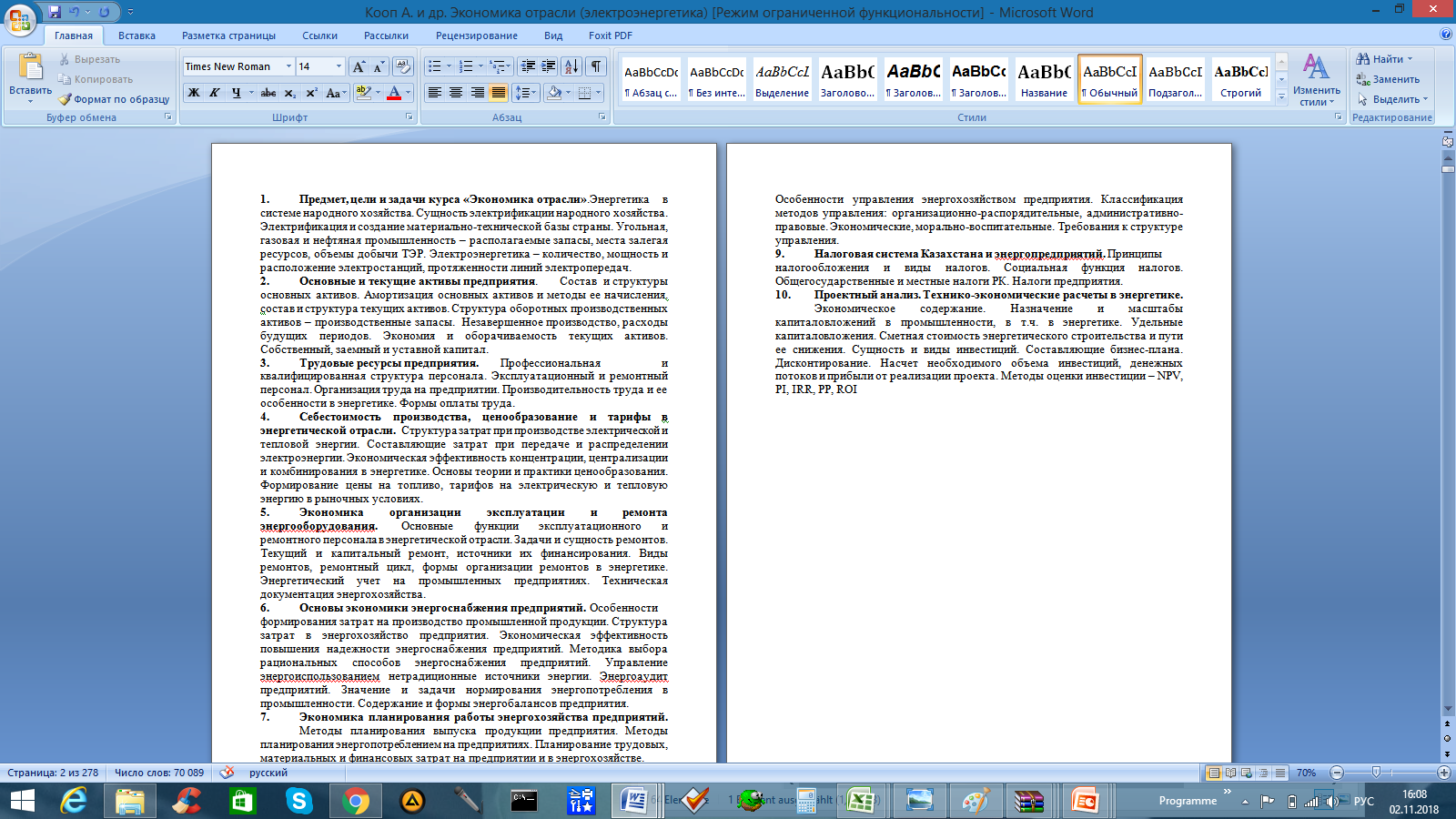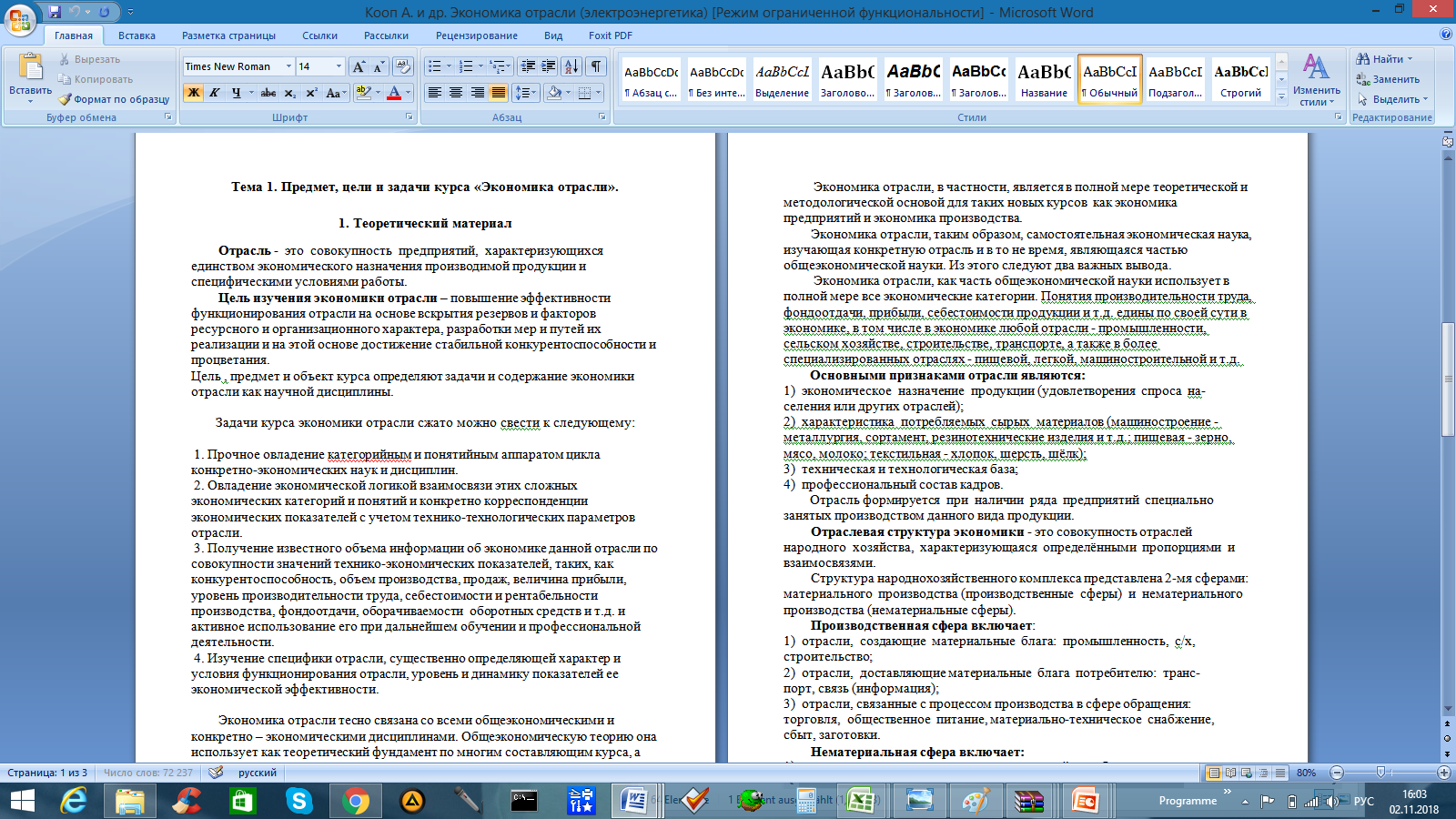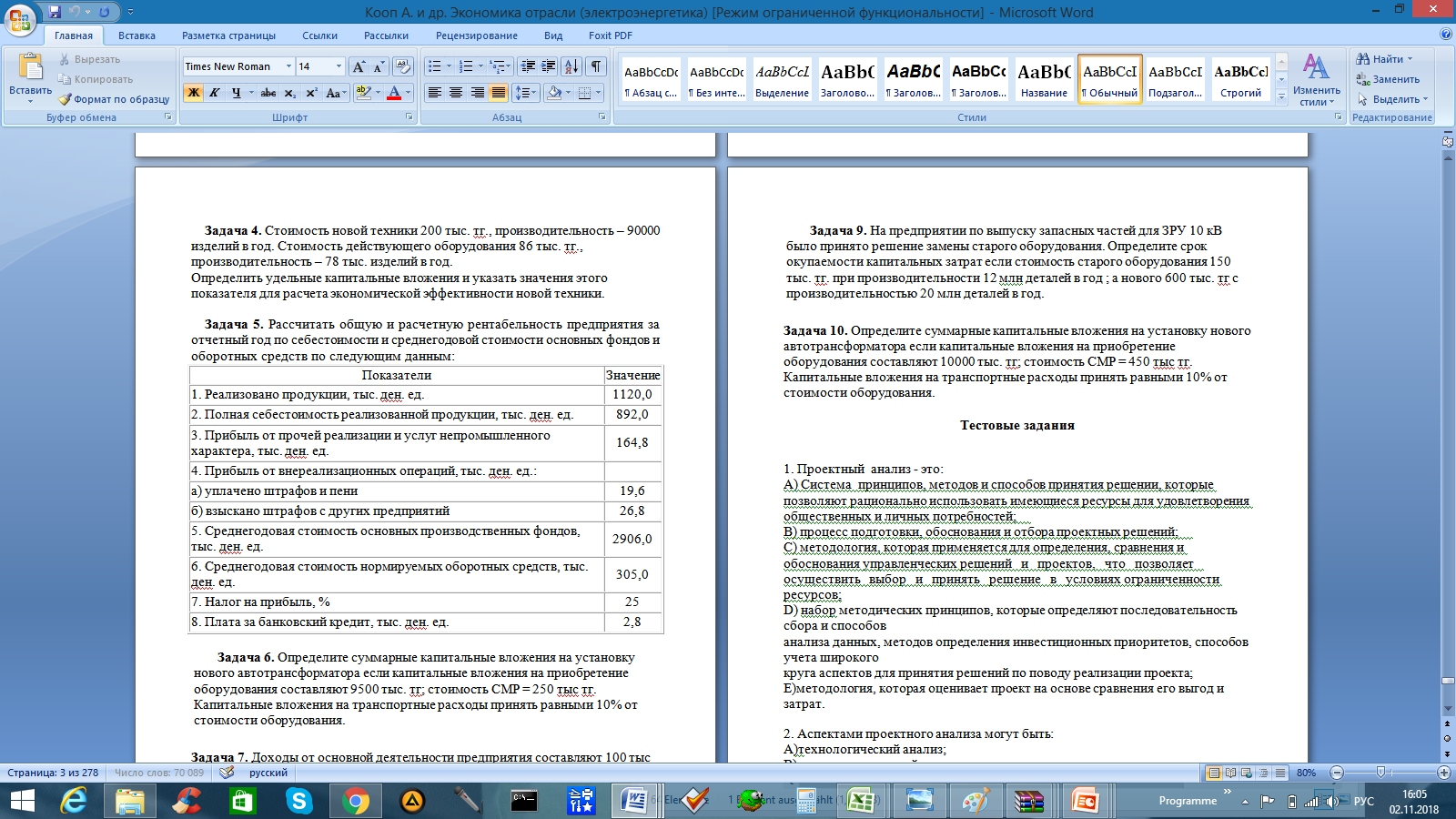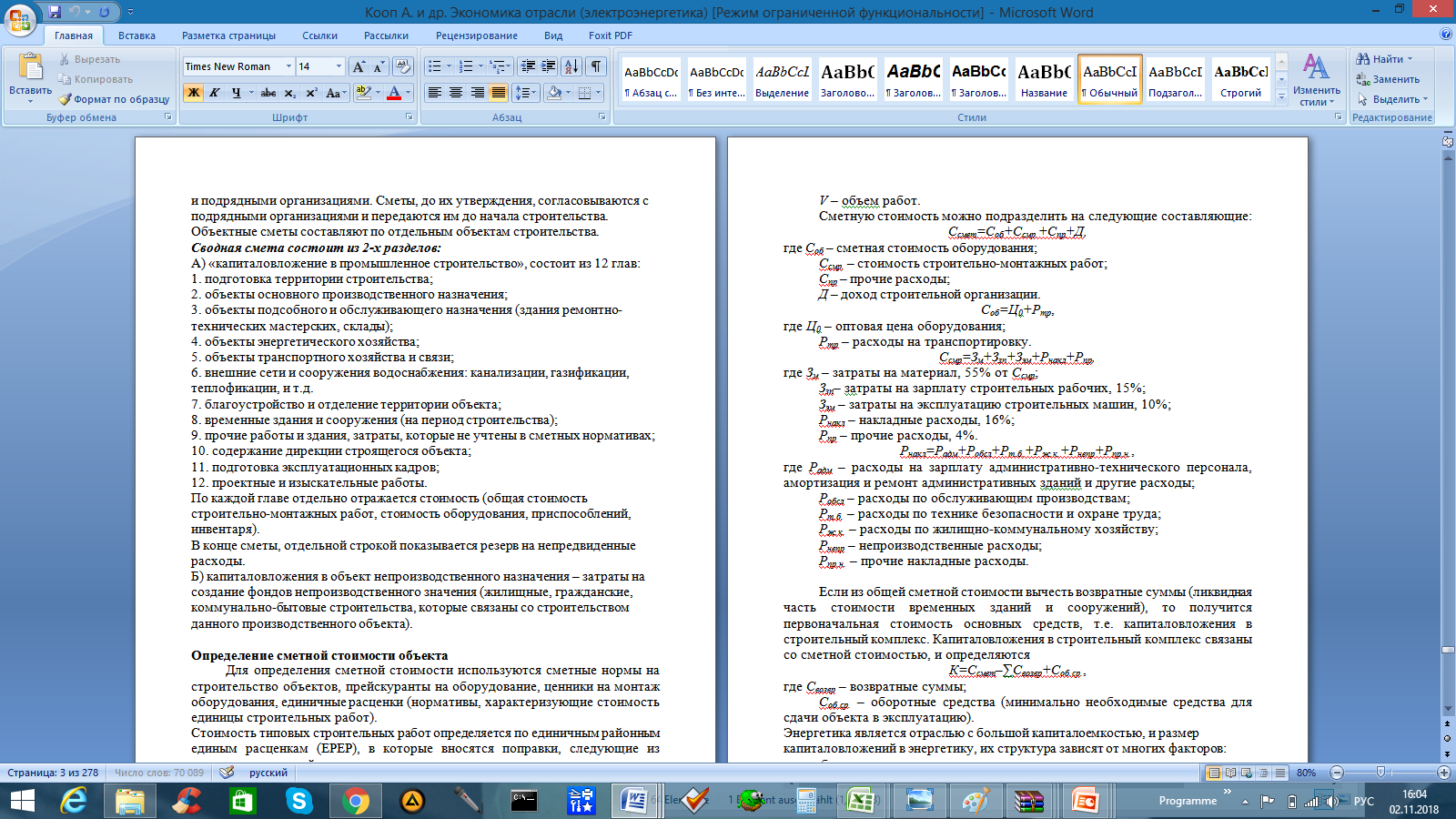Economic for Energy
Sold 0
Refunds 0
Good feedbacks 0
Bad feedbacks 0
1. The subject, goals and objectives of the course "Economics of the industry." Energy in the system of national economy. The essence of the electrification of the national economy. Electrification and the creation of the material and technical base of the country. Coal, gas and petroleum industry - disposable reserves, places of bedding resources, production volumes of fuel and energy resources. Electric power industry - the number, power and location of power plants, the length of power lines.
2. The main and current assets of the company. The composition and structure of fixed assets. Depreciation of fixed assets and methods of its accrual. composition and structure of current assets. The structure of current assets - production stocks. Work in progress, prepaid expenses. Savings and turnover of current assets. Own, borrowed and authorized capital.
3. Labor resources of the enterprise. Professional and qualified staff structure. Operating and maintenance personnel. Organization of labor in the enterprise. Labor productivity and its features in the energy sector. Forms of remuneration.
4. Cost of production, pricing and tariffs in the energy industry. Cost structure in the production of electrical and thermal energy. Components of costs for the transmission and distribution of electricity. Economic efficiency of concentration, centralization and combination in the energy sector. Fundamentals of the theory and practice of pricing. Formation of the price of fuel, tariffs for electric and thermal energy in market conditions.
5. Economics of the organization of operation and maintenance of power equipment. The main functions of operating and maintenance personnel in the energy industry. Tasks and the essence of repairs. Current and capital repairs, sources of their financing. Types of repairs, repair cycle, forms of organization of repairs in the energy sector. Energy accounting in industrial enterprises. Technical documentation of energy management.
6. Fundamentals of the economy of energy supply enterprises. Features of the formation of the cost of industrial production. Cost structure in the energy management of the enterprise. The economic efficiency of improving the reliability of power supply enterprises. Methods of choosing rational methods of energy supply of enterprises. Energy management unconventional energy sources. Energy audit of enterprises. The value and objectives of rationing energy consumption in industry. The content and forms of energy balance of the enterprise
7. Economics of planning the work of energy enterprises. Methods of planning the production of the enterprise. Energy planning methods in enterprises. Planning of labor, material and financial costs at the enterprise and in the energy sector.
8. Economics of management decisions of the energy industry. Goals and management functions in the energy sector. Organizational structure and schemes of energy management. Features of enterprise energy management. Classification of management methods: organizational and administrative, administrative and legal. Economic, moral and educational. Management structure requirements.
9. The tax system of Kazakhstan and energy companies. Principles of taxation and types of taxes. The social function of taxes. National and local taxes of the Republic of Kazakhstan. Enterprise taxes.
10. Project analysis. Technical and economic calculations in the energy sector. Economic content. The purpose and scale of investment in industry, including in energy. Specific investment. The estimated cost of energy construction and ways to reduce it. Essence and types of investments. Components of a business plan. Discounting. About the required volume of investments, cash flow and profits from the project. Investment appraisal methods - NPV, PI, IRR, PP, ROI
2. The main and current assets of the company. The composition and structure of fixed assets. Depreciation of fixed assets and methods of its accrual. composition and structure of current assets. The structure of current assets - production stocks. Work in progress, prepaid expenses. Savings and turnover of current assets. Own, borrowed and authorized capital.
3. Labor resources of the enterprise. Professional and qualified staff structure. Operating and maintenance personnel. Organization of labor in the enterprise. Labor productivity and its features in the energy sector. Forms of remuneration.
4. Cost of production, pricing and tariffs in the energy industry. Cost structure in the production of electrical and thermal energy. Components of costs for the transmission and distribution of electricity. Economic efficiency of concentration, centralization and combination in the energy sector. Fundamentals of the theory and practice of pricing. Formation of the price of fuel, tariffs for electric and thermal energy in market conditions.
5. Economics of the organization of operation and maintenance of power equipment. The main functions of operating and maintenance personnel in the energy industry. Tasks and the essence of repairs. Current and capital repairs, sources of their financing. Types of repairs, repair cycle, forms of organization of repairs in the energy sector. Energy accounting in industrial enterprises. Technical documentation of energy management.
6. Fundamentals of the economy of energy supply enterprises. Features of the formation of the cost of industrial production. Cost structure in the energy management of the enterprise. The economic efficiency of improving the reliability of power supply enterprises. Methods of choosing rational methods of energy supply of enterprises. Energy management unconventional energy sources. Energy audit of enterprises. The value and objectives of rationing energy consumption in industry. The content and forms of energy balance of the enterprise
7. Economics of planning the work of energy enterprises. Methods of planning the production of the enterprise. Energy planning methods in enterprises. Planning of labor, material and financial costs at the enterprise and in the energy sector.
8. Economics of management decisions of the energy industry. Goals and management functions in the energy sector. Organizational structure and schemes of energy management. Features of enterprise energy management. Classification of management methods: organizational and administrative, administrative and legal. Economic, moral and educational. Management structure requirements.
9. The tax system of Kazakhstan and energy companies. Principles of taxation and types of taxes. The social function of taxes. National and local taxes of the Republic of Kazakhstan. Enterprise taxes.
10. Project analysis. Technical and economic calculations in the energy sector. Economic content. The purpose and scale of investment in industry, including in energy. Specific investment. The estimated cost of energy construction and ways to reduce it. Essence and types of investments. Components of a business plan. Discounting. About the required volume of investments, cash flow and profits from the project. Investment appraisal methods - NPV, PI, IRR, PP, ROI
Authors: A. Koop, Yu. Sakhno, I. Shevchenko, M. Zheleznyakov, D. Kolesnik




